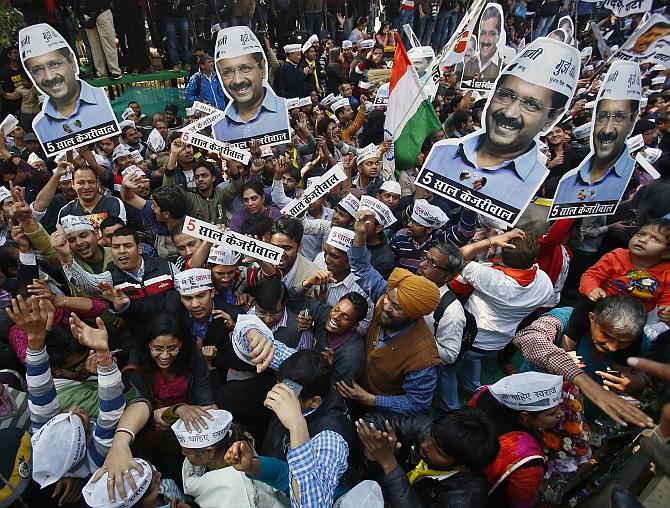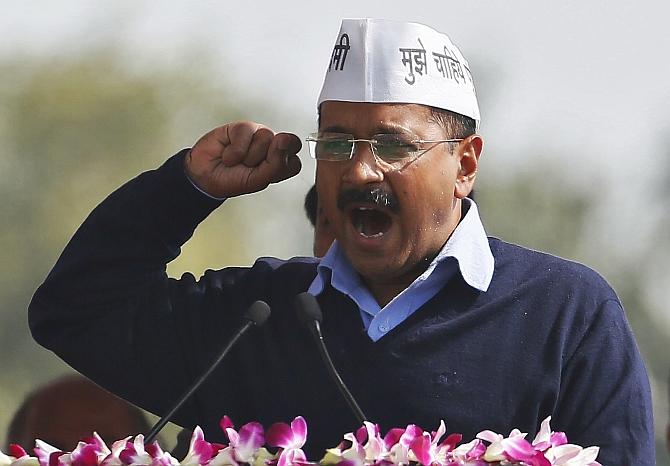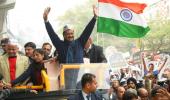'Brand Kejriwal-AAP have a long way to go even if they win another Delhi election...'
'It is a force nobody can ignore, not even Mr Modi, because it will keep punching above its weight,' notes Shekhar Gupta.

This has been a decade of start-ups. Hundreds of new ones have emerged and more than a dozen have achieved 'Unicorn' status (valuation at more than a billion dollars) in quick time.
Our vantage point, however, is political.
So, in our book, the political start-up of the decade was Arvind Kejriwal's Aam Aadmi Party.
Here are the many reasons why.
First, with established political parties and caste-ethnic-ideological forces with ossified vote banks and entrenched dynasties, the entry barriers for newcomers in our politics are the steepest.
That's why start-ups of the past -- from the Jana Sangh, the Swatantra Party, and Janata Party to the Telugu Desam, BJD, TMC and even durable ones like the DMK -- have drawn their ideology, leadership, vote banks or caste/ethnic loyalties from a pre-existing force.
AAP is sui generis.
Establishing yourself even in one small but prominent state, and building brand recognition all over the country, therefore, is a formidable achievement.
Officially, AAP was launched on November 26, 2012.
We'd say, however, the entrepreneurial idea was sown sometime in late 2010.
This is when the premature self-destruction of the UPA, or more specifically the Congress, caught its main rival, the BJP, unprepared.
There was space available for just some time until Narendra Damodardas Modi took charge of his party.
This is when Mr Kejriwal was acquiring the national limelight as an anti-corruption campaigner while being seen as incorruptible himself.
This, we must note, was also the year when almost all institutions of the old establishment, from politics to bureaucracy, the media and the corporates, suffered a precipitous loss of trust and respect.
It was exacerbated by the Radia Tapes disclosures.
It fed conveniently into a 'sab chor hain (everybody's a thief)' mindset.
No established party or leader was spared by this fury.
If everybody was already declared a thief, India was desperate to see somebody who wasn't.
In walked the insurgents. Mr Kejriwal and his young team were not yet touched by power and, thereby, corruption.
They had modest personal lifestyles, spoke a simple idiom, and sounded convincing.
All they did was berate and condemn the established political class and elites (from Manmohan Singh to Mukesh Ambani) as unworthy of India's trust.
Kishan Baburao 'Anna' Hazare arrived on the scene as a force multiplier.
Nevertheless, Anna was used and discarded within two years (his fast took place in 2011) and AAP came into being in 2012, the first new political party with heft in decades, with zero political legacy, vote banks, dynasties, or an ideology.
This new proposition was neither Left nor Right nor Centre, and so could conveniently attack any party with these ideologies on the day, or align with anybody to discard them later -- from the Congress in Delhi to the Sikh radical groups in Punjab.
Mr Kejriwal's genius in political entrepreneurship lay in how he used all of this: Lack of ideology and political fidelity, a ruthless use-and-discard approach for friend and foe, a redefinition of welfare wrapped in high nationalism -- Bharat Mata ki jai and Bhagat Singh's portraits all became his venture's USP.
He was moving into the political market, but with a product that pretended to be not like any other.
That is brilliant entrepreneurship.
Like any classical start-up, AAP also went through near-death moments, some of them self-made.
Like the disaster of the Lok Sabha elections in 2019, when it finished a distant third, behind even the Congress, in most Delhi assembly segments.
From being written off then, it has made a smart recovery, and now looks like the front-runner in the Delhi election
Again, like typical start-ups, AAP has had continuing HR troubles.
Or, maybe worse, with so many key people, including ministers, expelled on charges ranging from corruption to filming themselves having extra-marital, if consensual, sex.
As we often see with start-ups, there has been an exodus of many co-founders.
I may be stretching it, but in Yogendra Yadav and Prashant Bhushan, Mr Kejriwal may even have his equivalent of Mark Zuckerberg's Winklevoss twins.
AAP has also built a trait essential for start-ups, which, sometimes, is also the cause of their self-destruction: An almighty personality cult around one leader.

Those who follow my work -- written or spoken -- would know my often sceptical view of AAP's politics.
As a commentator, I have been at argumentative odds with AAP leaders since the Anna movement.
Searching for their non-existent ideology, I read up Mr Kejriwal's best-selling charter, Swaraj.
You can read the pamphlet-sized book in good time -- I finished it by the time we were overhead Bhopal, halfway on a Bengaluru-Delhi flight.
It was a mish-mash of ideas and idealism drawn from anecdotal wisdom over two-and-a-half millennia.
The core came from the supposedly democratic kingdom of Vaishali in ancient times.
If this is how they planned to change the country and the 'system', it was never going to happen.
To their credit, after they got power, they gradually retreated into an establishmentarian calm, or at least relatively so.
You now rarely see them abuse anybody, hold morchas, or sound angry.
They follow the laws and the Constitution, run a remarkably clean ship, and have developed their own version of non-ideological, underclass welfare.
This change, and success, critics have to acknowledge.
Compare Mr Kejriwal with another leader in a similar age group, Rahul Gandhi.
I will confine myself to how each has responded to three big challenges in our politics since the rise of Mr Modi: Nationalism, religion, and welfare ideology.
Unlike Rahul, Mr Kejriwal never went to JNU during its troubles.
He was smart enough to stay far away from the 'tukde-tukde' fire.
Recall what he said when Kanhaiya Kumar and Umar Khalid were arrested.
If he had control over the police, Mr Kejriwal said, those who'd actually shouted the 'tukde-tukde' slogans would have been in jail and the innocents free.
I know this entirely fails today's test of being woke.
But what did Rahul get for trying to pass it? Mr Kejriwal was quick to hail the surgical strikes, Balakot, and voted for Article 370.
He wouldn't concede nationalism to Mr Modi.
And Bhagat Singh is an enormously more powerful icon than Savarkar.
While Rahul hopped between temples, Mr Kejriwal kept his under-stated soft Hindu identity, never succumbing to the intellectual Left's demands for secular purity, and even launched a free pilgrimage programme for senior citizens.
The list of pilgrimages did have Ajmer Sharif, but most of these were to Hindu and Sikh holy places, and his advertising painted him as a modern-day Shravan Kumar, the storied, model son from India's past who took his ageing parents to all 84 centres of Hindu pilgrimage on his shoulders.
At the same time, Mr Kejriwal was quick to host the T M Krishna concert when forces of the Hindu Right forced it out elsewhere.
Later, there was a huge, community Diwali mela with lasers, as a woke statement against fire-crackers.
We know that Brand Kejriwal-AAP have a long way to go even if they win another Delhi election.
But they are now an established party with a uniquely flexible politics.
We will agree with it sometimes, disagree often, but it is a force nobody can ignore, not even Mr Modi, because it will keep punching above its weight.
As it does, for example, on social media.
We know that in start-up terms, dominating one small state in a decade seems modest.
But in a nation's politics, particularly India's, it's a pretty short time.
With special arrangement with The Print
Shekhar Gupta is the editor, The Print.











